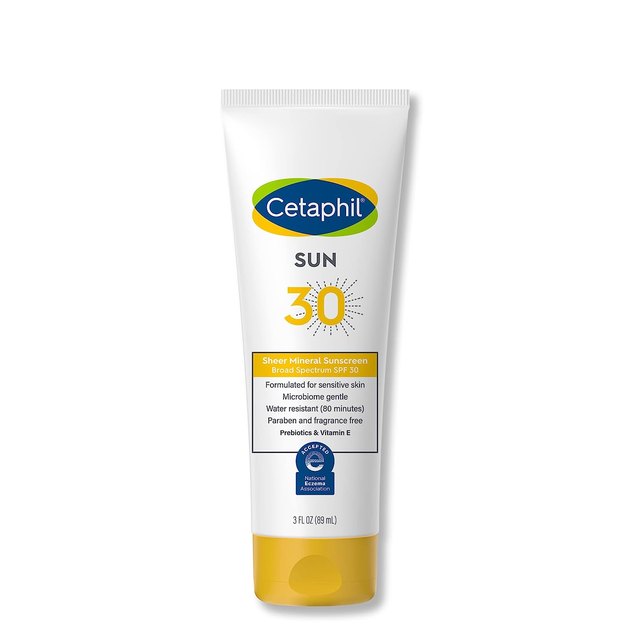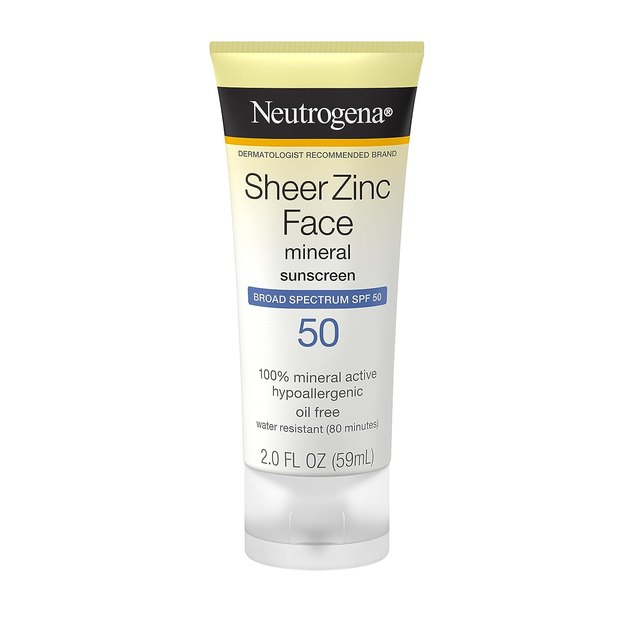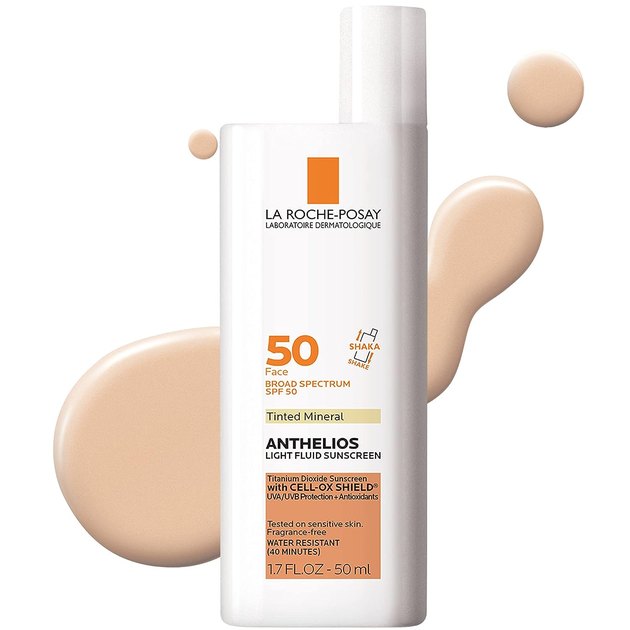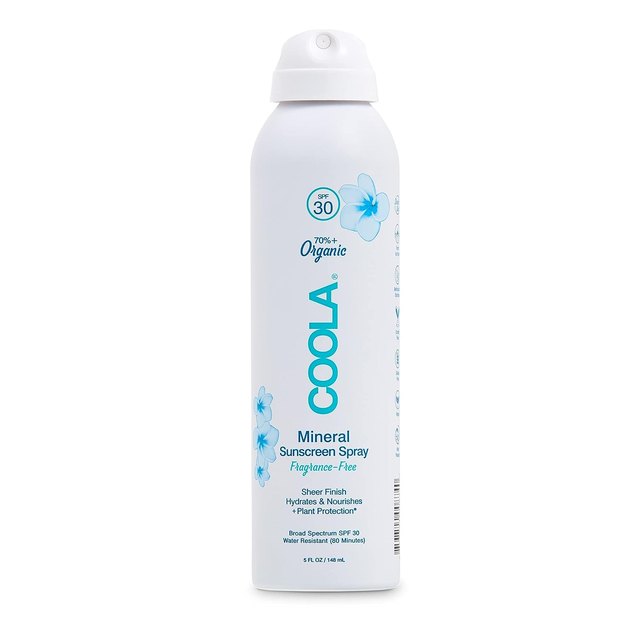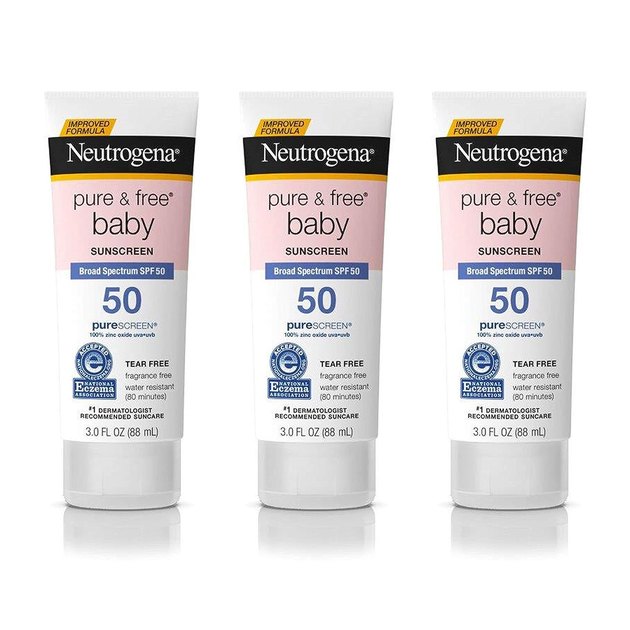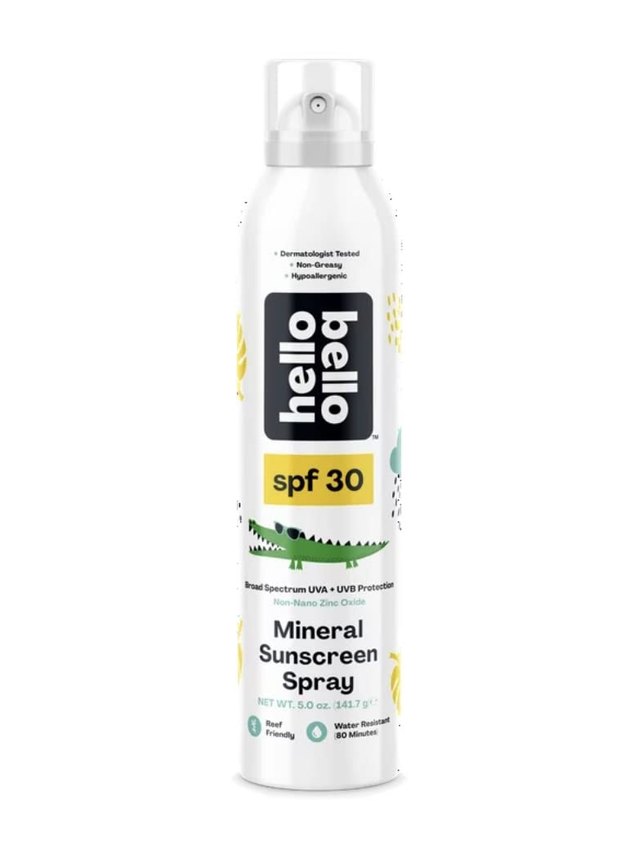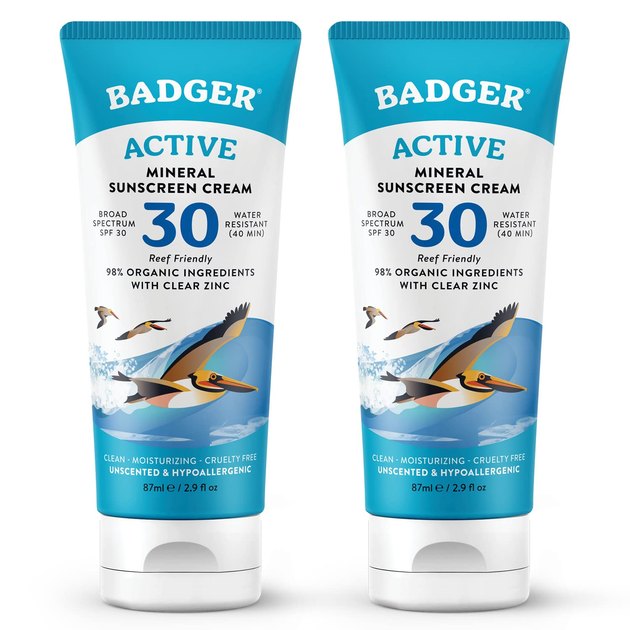
If you deal with eczema, you probably spend a lot of time trying to avoid triggers to keep symptoms like itching and redness at bay.
You're likely cautious when it comes to choosing skin care products and ingredients — especially sunscreen, which you should be using daily, and on large areas of your body.
Video of the Day
"A sunscreen for eczema-prone skin should be gentle, fragrance-free, hypoallergenic and free of parabens," says Dendy Engelman, MD, cosmetic dermatologist and Mohs surgeon at Shafer Clinic in New York City. "It's also important to look for mineral sunscreen with zinc oxide or titanium dioxide, instead of using chemical sunscreens, as it protects from harmful UV rays without penetrating the skin."
With that in mind, here are the best sunscreens for sensitive skin prone to eczema.
Tip
If you have sensitive skin, it's always a good idea to test a new product on a small area of skin first before using it all over your face or body. The American Academy of Dermatology (AAD) recommends applying the product to a quarter-sized test spot (such as the bend of your elbow) twice daily for seven to 10 days.
How We Chose
We chatted with dermatologists, who broke down the most important features of sunscreen for eczema-prone skin. Our top picks are based on their criteria, including:
- Active ingredients
- Added ingredients
- SPF
- Consistency
Find more information on how we choose and cover products here.
The Best Sunscreens for Eczema
- Best Overall: Blue Lizard Sensitive ($13.10, Amazon)
- Best on a Budget: Cetaphil Sheer Mineral Sunscreen Lotion ($9.17, Amazon)
- Best for Face: Neutrogena Sheer Zinc Face Sunscreen ($12.69, Amazon)
- Best Tinted: La Roche-Posay Anthelios Tinted Mineral Sunscreen SPF 50 ($37.49, Amazon)
- Best Spray: COOLA Organic, Fragrance-Free Mineral Sunscreen Spray SPF 30 ($32, Amazon)
- Best for Babies: Neutrogena Pure and Free Baby Mineral Sunscreen ($32.99, Amazon)
- Best for Kids: Hello Bello SPF 30 Kid's Mineral Sunscreen Spray ($13.99, Hello Bello)
- Best Water-Resistant: Badger Active Mineral Sunscreen Cream SPF 30 ($28.99, Amazon)
1. Blue Lizard Sensitive
Pros
- 50+ SPF
- Reef-safe
- Bottle changes color to indicate when you need to reapply
Cons
- Can sting if you have a flare-up at the time of application
This mineral sunscreen contains zinc oxide and provides broad-spectrum coverage, which blocks all UV rays from getting to the skin, explains Marisa Garshick, MD, dermatologist at Medical Dermatology & Cosmetic Surgery in New York City.
It's also high in SPF (50+).
"This sunscreen is free of chemical active ingredients and is both paraben-free and fragrance-free, making it a great option for sensitive skin," Dr. Garshick says. "It is a great option for summer days as it is also water-resistant."
Another cool feature of this sunscreen is that the bottle changes color when it's exposed to UV light, so you always know when to reapply.
2. Cetaphil Sheer Mineral Sunscreen Lotion SPF 30
Pros
- Affordable
- Travel size
- Water-resistant up to 80 minutes
- Accepted by the National Eczema Association
Cons
- Leaves a white cast that’s difficult to rub in
This hydrating formulation contains a blend of zinc oxide and titanium dioxide, which work together to provide broad-spectrum coverage that won't irritate eczema-prone skin.
In addition, it contains soothing antioxidants that help reduce your exposure to free radicals in the environment that can damage your skin over time.
"This mineral sunscreen is fragrance- and paraben-free, making it a good option even for those with dry or sensitive skin," adds Dr. Garshick.
3. Neutrogena Sheer Zinc Face Sunscreen
Pros
- Provides high SPF coverage
- Affordable
- Water-resistant
- Non-greasy finish
Cons
- Difficult to rub in
- Goes on thick
This easy-to-find, 100-percent mineral sunscreen provides coverage against both UVA and UVB rays using zinc oxide.
"It is especially great for those with sensitive skin as it is free of fragrance, parabens, phthalates and dyes, and it has been awarded the National Eczema Association Seal of Acceptance for those with sensitive skin," says Dr. Garshick.
"Additionally, it incorporates dry-touch technology to ensure that the sunscreen dries easily and won't leave the skin feeling greasy."
4. La Roche-Posay Anthelios Tinted Mineral Sunscreen SPF 50
Pros
- High SPF coverage
- Lightweight
- Water-resistant up to 40 minutes
- No white cast
Cons
- Expensive
- Has a strong smell
If you're looking for a tinted sunscreen that's safe for sensitive skin, this is a great brand to try.
It's ultra-light, fast-absorbing and goes on smooth, notes Dr. Garshick.
"It is easy to apply and also offers antioxidant protection through the Cell-Ox Shield Technology, meaning it combines titanium dioxide and zinc oxide to provide mineral-based coverage," she says. "It also comes in a non-tinted formulation for those who prefer that."
5. Coola Organic, Fragrance-Free Mineral Sunscreen Spray SPF 30
Pros
- Lightweight
- Free of fragrance
- Water-resistant up to 80 minutes
Cons
- Expensive
- Difficult to rub in
Spray sunscreens can often be too irritating for people with eczema-prone sunscreen, but this one is nice and gentle.
It's a mineral-based sunscreen that is also fragrance-free — two features that seriously cut down on irritation and don't amplify existing redness.
It's also water-resistant, which comes in handy if you're using it during a workout or a day at the beach or pool.
This sunscreen is also enriched with antioxidants, such as cocoa seed extract, algae extract and jasmine extract, which help ward off free radicals lurking in the environment that can compromise your skin health.
6. Neutrogena Pure and Free Baby Mineral Sunscreen
Pros
- Hypoallergenic
- Unscented
- Tear-free
- Accepted by the National Eczema Association
Cons
- Goes on thick
- Difficult to rub in
Eczema is one of the most common skin conditions in babies, often appearing within the first six months to 5 years, according to the National Eczema Association (NEA).
When shopping for the best sunscreen for babies with eczema, it's a good idea to avoid any fragrances and opt for a mineral sunscreen like this one from Neutrogena, which contains 100 percent zinc oxide.
It's also been awarded the NEA Seal of Acceptance.
"Even for the most reactive eczematous skin, it is tolerated," says Jodi LoGerfo, DNP, APRN, FNP-BC, a doctor of nursing practice and family nurse practitioner certified in family medicine and dermatology.
Tip
Sunscreen is only recommended for babies older than 6 months, per the AAD. Babies younger than 6 months should be kept out of the sun.
7. Hello Bello SPF 30 Kid's Mineral Sunscreen Spray
Pros
- Mineral-based
- Spray application
- Contains moisturizing ingredients
- Non-greasy feel
Cons
- Leaves a white cast
- Not as widely available as some other sunscreens
As any parent knows, trying to apply sunscreen on an energetic and wiggly kid who's ready to enjoy fun in the sun can be challenging. That's where this mineral spray sunscreen can come in handy.
It offers both UVA and UVB protection, contains non-nano zinc oxide for a mineral-based application and is formulated with sunflower and safflower oils, which are gentle and moisturizing on eczema-prone skin.
It's also reef friendly and water-resistant for up to 80 minutes. Just be sure to reapply every 80 minutes if your kiddo is enjoying the water.
How to Safely Apply Spray Sunscreen
The AAD offers the following tips for applying spray sunscreen, to avoid inhalation and make sure you're using enough:
- Make sure you're out of the wind and far from any open flames, including things like candles, grills and cigarettes.
- Hold the nozzle close to your skin and spray until the skin glistens.
- Use your hands to rub in the sunscreen until your skin is dry.
- Don't spray the sunscreen directly on your face. Instead, spray it into your hands and then rub onto your face (or consider using a separate facial sunscreen lotion).
8. Badger Active Mineral Sunscreen Cream SPF 30
Pros
- Doesn’t leave a white cast
- Water-resistant up to 40 minutes
- Unscented
- Reef-friendly
Cons
- Can be difficult to spread onto the skin
Badger is known for its natural and eco-friendly products, so it's no surprise it makes a mineral sunscreen formulated with sustainable, reef-safe ingredients that are gentle on eczema-prone skin.
This one is hypoallergenic, non-comedogenic (won't clog pores) and water- and sweat-resistant for up to 40 minutes. It won't cause irritation and leaves a glossy finish instead of a pale, white cast.
Why Sunscreen Is Important for People With Eczema
Sun protection is important for everyone to reduce the risk of skin cancer, but sunscreen is doubly crucial for people with eczema-prone skin because exposure to the sun's UV rays can often trigger a flare-up.
Heat can also be a factor that causes eczema to flare, according to the National Eczema Society, so, in addition to wearing sunscreen, it's a good idea to limit the amount of time you spend in the sun overall.
What to Look for in Sunscreen for Eczema
Here are some features dermatologists recommend looking for when shopping for a sunscreen for eczema-prone skin.
1. Mineral-Based Active Ingredients
Mineral sunscreens contain ingredients that essentially sit on the skin's surface to ward off the sun's harmful UV rays, while chemical sunscreens are actually absorbed by your skin in order to provide protection.
Chemical sunscreens can unfortunately be quite irritating to eczema-prone skin because some contain ingredients such as oxybenzone and avobenzone that can cause allergic contact dermatitis, notes Dr. Engelman.
Not everyone with eczema will react to these ingredients, but to err on the side of caution, she recommends a mineral-based sunscreen that contains titanium dioxide and/or zinc oxide, which are less irritating.
2. SPF 30 or Higher
The AAD recommends using a sunscreen that offers an SPF of 30 minimum, which blocks 97 percent of the sun's UVB rays.
It's also a good idea to make sure a sunscreen offers broad-spectrum coverage, which means it protect against both UVA and UVB rays, notes Brendan Camp, MD, a Manhattan-based dermatologist at MDCS Dermatology.
3. Thicker Consistency
Not all sunscreens are created equal when it comes to their consistency — and this quality matters, especially if you're prone to eczema.
Dr. Garshick recommends opting for a cream consistency that's easily spreadable.
"Creams or lotions are preferred forms of sunscreen for those with eczema as they tend to be the most hydrating," she says. "Since those with eczema tend to have dry skin, lightweight lotions or gels may be too drying and irritating on the skin."
The NEA notes that thicker sunscreen balms and stick sunscreens are best for people with this condition because they're less likely to contain alcohol, which can be drying and irritating.
Tip
Search the National Eczema Association's product directory for NEA-approved sunscreens.
4. Beneficial Ingredients
When shopping for sunscreen for eczema-prone skin, you may also want to look for products that contain ceramides, an ingredient that helps to support the skin barrier.
"Squalane is another great ingredient for those prone to eczema, as it's a lipid that is naturally found in the skin and the natural moisture barrier that helps to nourish and moisturize the skin," says Dr. Garshick.
She also recommends shopping for sunscreens that contain hyaluronic acid, a humectant that can help to boost moisture, and niacinamide, which calms and soothes skin and helps to boost ceramide production, supporting the skin barrier.
What to Avoid in Sunscreen for Eczema
1. Chemical Sunscreens
Stay away from products that contain oxybenzone or avobenzone, as these are two common ingredients in chemical sunscreens that can cause irritation and contact dermatitis, notes Dr. Engelman.
Always check the "active ingredients" on the back of the sunscreen bottle or container — some that say they're "mineral-based" may contain both mineral and chemical sunscreens. Make sure the active ingredients are only zinc oxide and/or titanium dioxide.
2. Fragrances and Dyes
These can both be irritating to eczema-prone skin.
3. Powders
Some people may prefer powder sunscreens because they're easy to reapply, but Dr. Garshick says to steer clear: "Those with eczema may find powders to be too drying," she says.
4. Alcohol
Sunscreens with a high amount of alcohol can cause stinging and burning, per the NEA, so you should ideally use a product with little to no alcohol to avoid skin irritation.
Figuring out the amount of alcohol in a sunscreen can be difficult just by looking at the ingredient list, per the NEA, but if a sunscreen has the NEA Seal of Acceptance, that means it does not contain any alcohol.
- National Eczema Association: "Eczema Stats"
- Jodi LoGerfo, DNP, APRN, FNP-BC, Doctor of Nursing Practice and a Family Nurse Practitioner certified in Family Medicine and Dermatology
- Dendy Engelman, MD, cosmetic dermatologist and Mohs surgeon at Shafer Clinic in New York City
- National Eczema Association: "Causes, Symptoms, Treatment and More"
- National Eczema Society: "Sun and Eczema"
- Brendan Camp, MD, a Manhattan-based dermatologist at MDCS Dermatology
- American Academy of Dermatology: "Sunscreen FAQs"
- American Academy of Dermatology: "How to Use Stick and Spray Sunscreens"
- American Academy of Dermatology: "How to Test Skin Care Products"
- National Eczema Association: "Yes, Your Sunscreen Might Be Causing Your Eczema to Flare"
Is this an emergency? If you are experiencing serious medical symptoms, please see the National Library of Medicine’s list of signs you need emergency medical attention or call 911.

